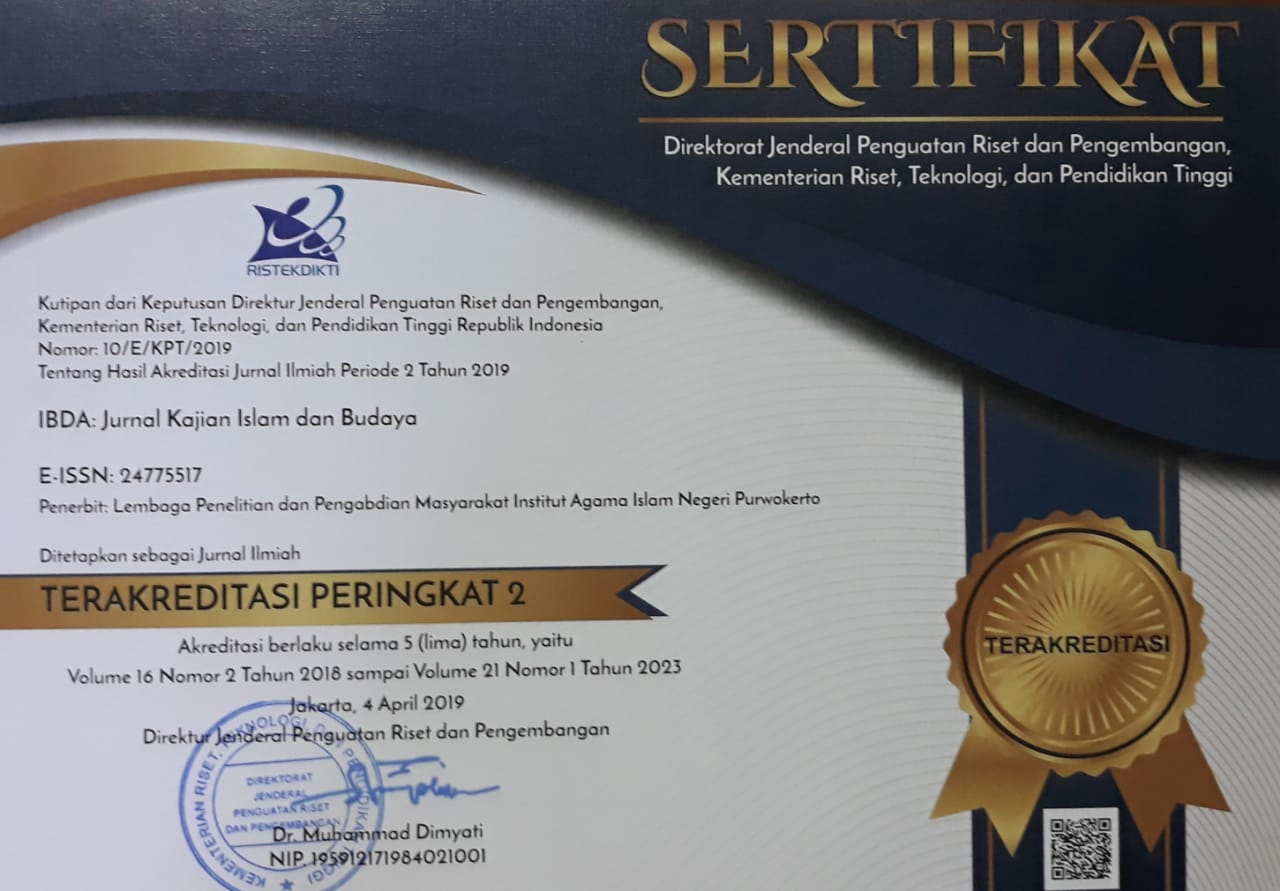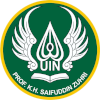TRADISI DAN RITUAL KEMATIAN WONG ISLAM JAWA
DOI:
https://doi.org/10.24090/ibda.v13i2.659Keywords:
tradisi, Wong Islam Jawa, variasi, Tuhan, keyakinanAbstract
This paper reveals the tradition of Javanese people on handlingthe death. Javanese muslims is understood in a framework of great and little tradition and the meaning in death tradition. Those items when it is revealed and understood practically seems to have a shift. The variation in death tradition because of the distance and the evolution. There are some important highlights; first, Javanese Muslims in understanding and doing the death ritual based on a strong basic as an honour for those who alive and as a symbolic dimension with other nature. Second, Javanese Muslims know that death is a way to go back to Allah so that the everybody should be in a purified condition and still has a belief that Allah is the only one to be worshiped. The people believe that Allah is the Most Forgiving so that Muslims should pray for all the mistakes and bad deed.Downloads
Download data is not yet available.
References
Ahyani, Shidqi. 2012. “Islam Jawa: Varian Keagamaan Masyarakat Muslim dalam Tinjauan Antropologi.†Jurnal Salam 15.1 (2012).
Eliade, Miracle. 2002. Mitos Gerakan Kembali Yang Abadi: Kosmos dan Sejarah (The Myth of the Eternal or Cosmos and History) Terj. Cuk Ananta. Yogyakarta: Ikon Teralitera.
Hamka. 1993. Tasawuf Perkembangan dan Pemurniannya. Jakarta: Pustaka Panjimas.
Kaplan, David. 2002. Teori Budaya (The Theory of Culture) Terj. Landung Simatupang. Yogyakarta: Pustaka Pelajar.
Lévi-Strauss, Claude. 2005. Antropologi Struktural (Anthropologie Structurale) Terj. Ninik Rochani Sjams. Yogyakarta: Kreasi Wacana.
Möller, André. 2005. Ramadan in Java: The Joy and Jihad of Ritual Fasting. Vol. 20. Almqvist & Wiksell International.
Solikhin, Muhammad.2010. Misteri Bulan Suro Perspektif Islam Jawa. Penerbit Narasi.
Subiantoro, Slamet. 2010. Antropologi Seni Rupa: Teori, Metode & Contoh Telaah Analitis. Surakarta: UNS Press.
Tjandrasasmita, Uka. 2000. Pertumbuhan dan Perkembangan Kota-kota Muslim di Indonesia: dari Abad XIII sampai XVIII Masehi. Kudus: Menara Kudus.
Thoha, Zainal Arifin. 2002. Eksotisme Seni Budaya Islam: Khazanah Peradaban dari Serambi Pesantren. Yogyakarta: Bukulaela.
Van Gennep. 1977. The Rites of Passage. London: Pinguins.
Wawancara dengan Somad (Ketua RT Desa Banjarsari, Rt 04/7, Kecamatan Bobotsari) pada 10 Juni 2014.
Woodward, Mark R. 1999. Islam Jawa: Kesalehan Normatif Versus Kebatinan (Normatif Piety and Mysticism) Terj. Hairus Salim HS. Yogyakarta: LKiS.
Eliade, Miracle. 2002. Mitos Gerakan Kembali Yang Abadi: Kosmos dan Sejarah (The Myth of the Eternal or Cosmos and History) Terj. Cuk Ananta. Yogyakarta: Ikon Teralitera.
Hamka. 1993. Tasawuf Perkembangan dan Pemurniannya. Jakarta: Pustaka Panjimas.
Kaplan, David. 2002. Teori Budaya (The Theory of Culture) Terj. Landung Simatupang. Yogyakarta: Pustaka Pelajar.
Lévi-Strauss, Claude. 2005. Antropologi Struktural (Anthropologie Structurale) Terj. Ninik Rochani Sjams. Yogyakarta: Kreasi Wacana.
Möller, André. 2005. Ramadan in Java: The Joy and Jihad of Ritual Fasting. Vol. 20. Almqvist & Wiksell International.
Solikhin, Muhammad.2010. Misteri Bulan Suro Perspektif Islam Jawa. Penerbit Narasi.
Subiantoro, Slamet. 2010. Antropologi Seni Rupa: Teori, Metode & Contoh Telaah Analitis. Surakarta: UNS Press.
Tjandrasasmita, Uka. 2000. Pertumbuhan dan Perkembangan Kota-kota Muslim di Indonesia: dari Abad XIII sampai XVIII Masehi. Kudus: Menara Kudus.
Thoha, Zainal Arifin. 2002. Eksotisme Seni Budaya Islam: Khazanah Peradaban dari Serambi Pesantren. Yogyakarta: Bukulaela.
Van Gennep. 1977. The Rites of Passage. London: Pinguins.
Wawancara dengan Somad (Ketua RT Desa Banjarsari, Rt 04/7, Kecamatan Bobotsari) pada 10 Juni 2014.
Woodward, Mark R. 1999. Islam Jawa: Kesalehan Normatif Versus Kebatinan (Normatif Piety and Mysticism) Terj. Hairus Salim HS. Yogyakarta: LKiS.
Downloads
How to Cite
Suwito, S., Hidayat, A., & Agus, S. (2015). TRADISI DAN RITUAL KEMATIAN WONG ISLAM JAWA. IBDA` : Jurnal Kajian Islam Dan Budaya, 13(2), 6–25. https://doi.org/10.24090/ibda.v13i2.659
Issue
Section
Articles
License
Authors who publish with this journal agree to the following terms:
- Authors retain copyright and grant the journal right of first publication with the work simultaneously licensed under a Creative Commons Attribution-ShareAlike License a that allows others to share the work with an acknowledgement of the work's authorship and initial publication in this journal.
- Authors are able to enter into separate, additional contractual arrangements for the non-exclusive distribution of the journal's published version of the work (e.g., post it to an institutional repository or publish it in a book), with an acknowledgment of its initial publication in this journal.
- Authors are permitted and encouraged to post their work online (e.g., in institutional repositories or on their website) before and during the submission process, as it can lead to productive exchanges, as well as earlier and greater citation of published work (See The Effect of Open Access).















